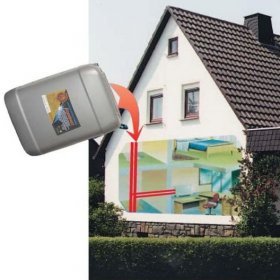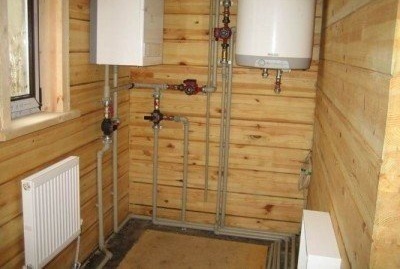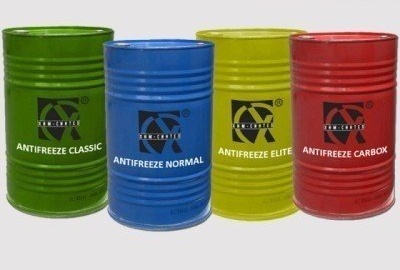Coolant for heating systems - water or antifreeze, which is better?

The most popular in other countries are heating systems with liquid coolant. This is a whole complex of heating equipment, which can be simple (open heating system) or complex, including heat exchangers, boiler rooms, pump stations, connected to each other by hundreds of meters of pipeline. The characteristics of the circulating fluid affect the operation of all equipment, so it is so important to choose the right coolant for heating systems.
What should be the coolant?
Unfortunately, the ideal fluid for the heating system has not yet been invented. This means that every known material is successfully operated only under certain conditions.
For example, an important circumstance is the temperature of the coolant in the heating system, in case of violation of which the substance changes its properties, and the system ceases to function.
If laid out on shelves, then the correct coolant should perform the following tasks:
- transfer maximum heat in a short amount of time around the perimeter of the work area (for example, a private house); while heat loss should be minimal;
- have a small viscosity, since this indicator affects the pumping speed, therefore, the value of efficiency;
- should not be the cause of corrosion of the components and mechanisms of the system, otherwise there will be a limitation when choosing them;
- It should be safe for residents of the house, that is, not exceed the norm for ignition temperature or toxicity (the same requirements for liquid vapors).
The cost of the coolant is also important: it must be either relatively cheap, or, in the case of high cost, possess properties that allow it to be used for a long time without replacement.
Water in the heating system
The predominant use of water is explained by its highest heat capacity among all liquids and no less high density. For example, a kilogram of water with a temperature of 90 ° C, cooling down to 70 ° C in a radiator, generates heat in an amount of 20 kcal.
Of course, water differs from synthetic substances in toxicological and environmental properties, it is absolutely safe for people. In the event of a leak, it will not cause much trouble, and its deficiency can be easily filled, filling in the missing amount of liquid. This coolant has no competitors and in cost - there is no cheaper liquid.
Attention! It is not recommended to use ordinary water in heating systems, since it is rich in oxygen and salts, and this is the scaling and corrosion that appears over time.
In order for the system to function smoothly, water should be softened. There are two rational ways:
- Thermal, based on elemental boiling.Water is placed in a large metal tank and heated. During boiling, carbon dioxide is removed, salts are deposited at the bottom of the vessel. Unfortunately, the persistent compounds of calcium and magnesium will remain in the water.
- Chemical, acting at the expense of reagents. With the help of soda ash, slaked lime, sodium orthophosphate, the salts in the water become insoluble and precipitate. Subsequent filtration will eliminate residual substances.
The ideal option is distilled water, the only negative of which is its purchase, while the usual one can be dialed from the tap. Many use rainwater, which compares favorably with tap, well and artesian.
In the case of water, an important role is played by the parameters of the heating medium of the heating system, namely, the temperature regime. As soon as the air temperature in the building drops below 0ºС, the liquid in the pipes will freeze, which threatens to seriously damage the heating system.
Antifreeze heating system
With the onset of cold weather, the “non-freezing” - non-freezing liquid for the heating system becomes relevant. Pipes filled with such a coolant will not burst at a low temperature - this moment is important for homeowners who use the house irregularly. The carrier of thermal energy of this type is antifreeze. As a rule, it is designed to operate at a temperature of -30 ° C or -65 ° C.
If the temperature drops below normal, the antifreeze for heating systems, in contrast to water, does not harden, but passes into a gel state. Returning to a liquid state, it does not lose its original properties and does not pose a threat to the heating circuit.
To remove scale or foci of corrosion, manufacturers add additives to the liquid - special inhibitors. Thanks to them, the service life of the heating system is increased by several years. However, it should be remembered that antifreeze for heating is not a universal fluid, and additives are suitable only for certain materials of construction. Some of them can destroy polymer pipes, others can cause corrosion of the electrochemical type.
Attention! The average antifreeze life is 5 years (10 seasons). After the specified period, the entire volume of coolant must be replaced. Manufacturers recommend a working period of 3 years.
If you compare antifreeze with water, in addition to the advantages, you can identify a number of disadvantages:
- increased viscosity requires equipping the heating equipment with a powerful circulation pump;
- 15% lower heat capacity, therefore, the amount of heat transferred is less;
- sealed detachable joints more carefully;
- radiators are required, which are 50% larger in volume than their water counterparts;
- an expansion closed tank is necessary, since during expansion there is increased expansion;
- the toxicity of a substance (for example, ethylene glycol) in the composition of antifreezes provides for its use in single-circuit type boilers.
Thus, before filling the heating system with antifreeze, it is necessary to consider installing a more powerful pump and a capacious expansion tank. Radiators should be voluminous, pipes - of a larger diameter. It is better to use teflon or paronite gaskets to seal detachable joints. If you decide to dilute antifreeze, you need only distilled water. Each subsequent filling of antifreeze requires a complete flushing of the heating system, including the boiler.
So what to choose?
The temperature of the cold season usually determines which is better to choose a liquid for radiators.
If the thermometer column does not fall below + 5 ° C, it is better to stop at purified water from impurities. Low winter temperatures require antifreeze heating systems.Of course, you can use water, and to save equipment, drain it from pipes, but in this case there is a risk of corrosion due to excessive humidity, which will fill empty pipes and radiators.
Attention! The type of heating system is selected at the design stage, since the systems under water and under antifreeze are fundamentally different.
What you need to remember when choosing antifreeze? Before filling the heating system with coolant, it is necessary to carefully study its following characteristics:
- composition and purpose of additives;
- the ability to interact with parts of the heating system made of plastic, non-ferrous metals, cast iron, rubber;
- permissible low temperature;
- term of use;
- safety for man and nature.
If water is used as a heat carrier, then everything is arranged according to the traditional scheme of an open or closed type.






8 comments